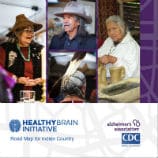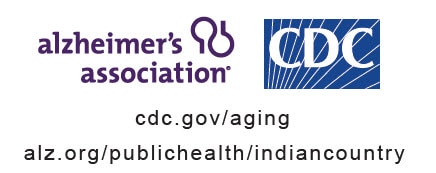10 Warning Signs of Alzheimer’s

Available for Download [PDF – 480 KB]
Memory often changes as people grow older. Some people notice changes in themselves before anyone else does. For other people, friends and family are the first to see changes in memory, behavior, or abilities. Memory loss that disrupts daily life is not a typical part of aging. People with one or more of these 10 warning signs should see a doctor to find the cause. Early diagnosis gives them a chance to seek treatment and plan for the future.
1
Memory loss that disrupts daily life: forgetting events, repeating yourself or relying on more aids to help you remember (like sticky notes or reminders).
2
Challenges in planning or solving problems: having trouble paying bills or cooking recipes you have used for years.
3
Difficulty completing familiar tasks at home, at work, or at leisure: having problems with cooking, driving places, using a cell phone, or shopping.
The Centers for Disease Control and Prevention (CDC) and the Alzheimer’s Association have created the Healthy Brain Initiative’s (HBI) Road Map for Indian Country.
It is designed to help American Indian and Alaska Native (AI/AN) community leaders learn about dementia and start discussions throughout their communities. The Road Map for Indian Country suggests eight public health strategies that embrace community strengths including traditional practices, resilience, and existing services.

4
Confusion with time or place: having trouble understanding an event that is happening later, or losing track of dates.
5
Trouble understanding visual images and spatial relations: having more difficulty with balance or judging distance, tripping over things at home, or spilling or dropping things more often.
6
New problems with words in speaking or writing: having trouble following or joining a conversation or struggling to find a word you are looking for (saying “that thing on your wrist that tells time” instead of :”watch”).
7
Misplacing things and losing the ability to retrace steps: placing car keys in the washer or dryer or not being able to retrace steps to find something.
8
Decreased or poor judgment: being a victim of a scam, not managing money well, paying less attention to hygiene, or having trouble taking care of a pet.
9
Withdrawal from work or social activities: not wanting to go to church or other activities as you usually do, not being able to follow football games or keep up with what’s happening.
10
Changes in mood and personality: getting easily upset in common situations or being fearful or suspicious.

Disclaimer: The mark “CDC” is owned by the U.S. Department of Health and Human Services (HHS) and is used with permission. Use of this logo is not an endorsement by HHS or the Centers for Disease Control and Prevention (CDC) or any particular product, service, or enterprise.